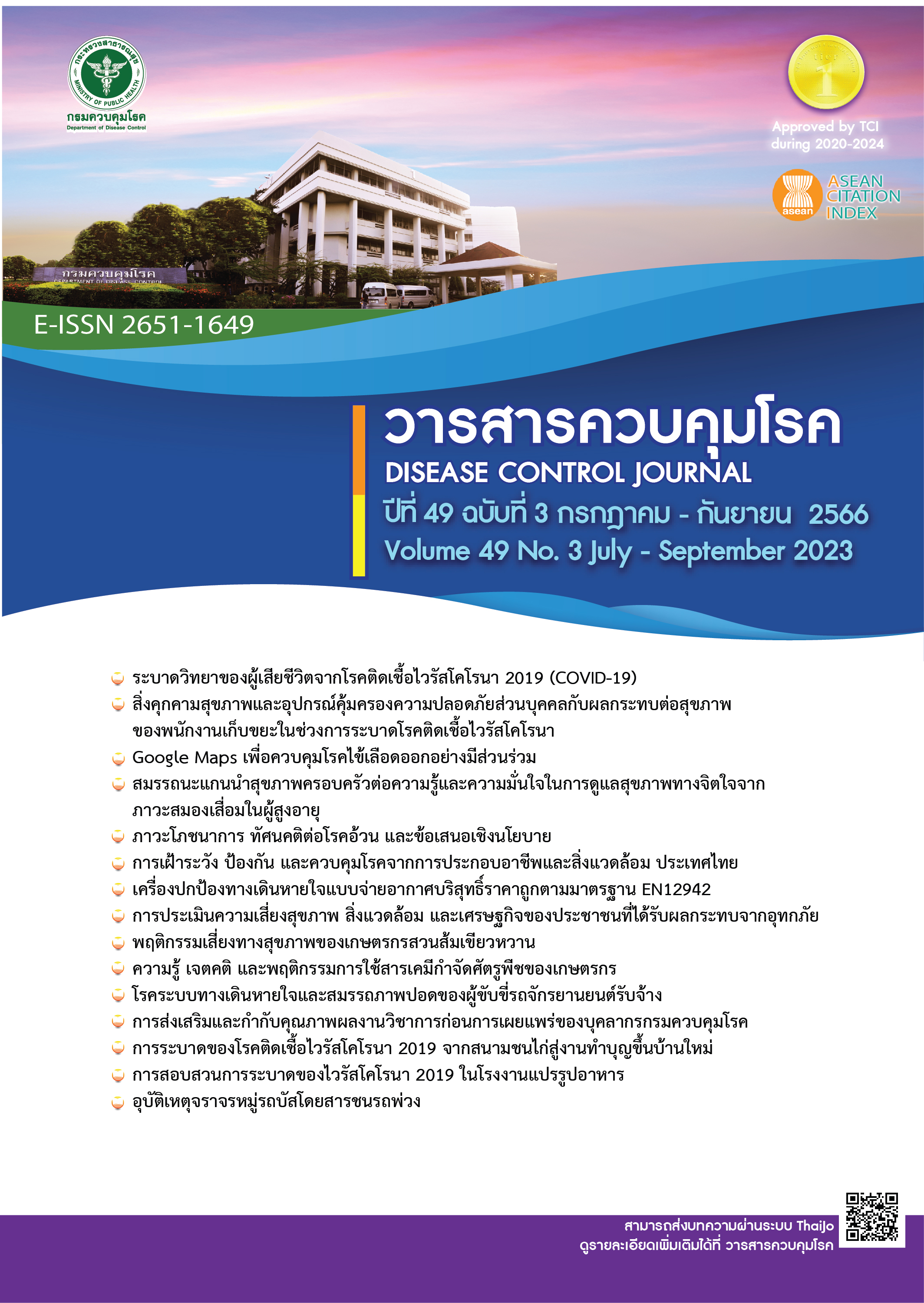Design and construction of a low-cost, powered air purifying respirator in accordance with EN12942 standard for healthcare professionals
DOI:
https://doi.org/10.14456/dcj.2023.47Keywords:
Powered Air Purifying Respirator (PAPR), personal protective equipment (PPE), fresh air supply, healthcare professionalsAbstract
The objective of this research is to design and construct a low-cost, Powered air purifying respirator (PAPR) in accordance with the EN12942 standard for healthcare professionals. This device is used with the RSU PMASK N99 by applying a snorkeling mask as a preventive measure against germs during work. As a result of the research, the study was able to successfully design and construct a powered air purifying respirator (PAPR) device in accordance with EN12942 standard and this PAPR can be used with a full-face mask. The powered air purifying respirator device consisted of 3 components: 1) an electrical circuit using a DC motor control circuit; 2) a DC 12V 20,000 mAh rechargeable lithium-ion battery being used as a power supply, and 3) the device structure. Test results have demonstrated that the PAPR device was able to supply fresh air with a maximum airflow of 120 liters per minute and could be used for a maximum of 5 hours and 17 minutes. There was an alarm indicating the battery voltage level. An average noise level of device was 69.91 dBA; a total weight was 2.42 kg and the device could be used in combination with a full-face mask during work. The materials used in the design and construction of the device can be purchased locally and inexpensively. The results of the satisfaction assessment of the use of the sample group of medical personnel from Ramathibodi hospital who regularly use the powered air purifying respirator with fresh air supply by 4 samples found that they are very satisfied.
Downloads
References
World Health Organization. Coronavirus disease 2019 (COVID-19) WHO Thailand Situation Report 213-9 December 2021 [EN/TH] [Internet]. [cited 2021 Dec 25]. Available from: https://reliefweb.int/report/thailand/coronavirus-disease-2019-covid-19-who-thailand-situation-report-213-9-december-2021
Limwongtong N, Muangtharm W. Providing an offence of stockpiling controlled goods and selling over priced products as the predicate offence in accordance with the anti-money laundering act. Journal of Research and
Academics [Internet]. 2020 [cited 2021 Sep 15];4(1):73-85. Available from: https://so06.tci-thaijo.org/index.php/jra/article/download/243262/166374 (in Thai)
Tompkins BM, Kerchberger JP. Special article: personal protective equipment for care of pandemic influenza patients: a training workshop for the powered air purifying respirator. Anesth Analg. 2010;111(4):933-45.
U.S. Centers for Disease Control and Prevention Division of Global Health Protection (DGHP) laboratory branch, Thailand: U.S. CDC. Fit testing the newly designed Pneumask model M2068G developed by Biomedical Engineering College Rangsit University [Internet]. 2020 [cited 2022 Sep 13]. Available from: https://drive.google.com file/d/1hKX3kmus7aaPHZ0EBe ZMT tzoyaMQmXt8/view?usp=drive_link
Khoo KL, Leng PH, Ibrahim IB, Lim TK. The changing face of healthcare worker perceptions on powered air purifying respirators during the SARS outbreak. Respirology (Carlton, Vic). 2005;10(1):107-10.
Bharatendu C, Ong JJY, Goh Y, Tan BYQ, Chan ACY, Tang JZY, et al. Powered Air Purifying Respirator (PAPR) restores the N95 face mask induced cerebral hemodynamic alterations among Healthcare Workers during COVID-19 Outbreak. J Neurol Sci. 2020;417:117078.
Eyre AJ, Hick JL, Thorne CD. Chapter 46 - Personal Protective Equipment. In: Ciottone GR, editor. Ciottone's Disaster Medicine (2nd ed). Philadelphia: Elsevier; 2016. doi: 10.1016/B978-0-323-28665-7.00046-7.
Hubbard BR, Pearce JM. Conversion of self-contained breathing apparatus mask to opensource powered air-purifying particulate respirator for fire fighter COVID-19 response. HardwareX. 2020;8:e00129.
British Standards Institution (BSI) (26641). Respiratory protective devices-Power assisted filtering devices incorporating full face masks, half masks or quarter masks-Requirements, testing, marking. London: British Standards Institution; 1999.
Licina A, Silvers A. Use of powered air-purifying respirator (PAPR) as part of protective equipment against SARS-CoV-2-a narrative review and critical appraisal of evidence. Am J Infect Control. 2021;49(4):492-9.
Licina A, Silvers A, Stuart RL. Use of powered air-purifying respirator (PAPR) by healthcare workers for preventing highly infectious viral diseases-a systematic review of evidence. Syst Rev. 2020;9(1):173.
Wangtawesap K. PAPR masks made by Thais help in the fight against COVID-19 and substitute for N95 masks. [Internet]. 2020 [cited 2021 Sep 15]. Available from: https://sustainability.pttgcgroup.com/en/newsroom/featured-stories/262/papr-masks-made-by-thais-help-in-the-fight-against-covid-19-and-substitute-for-n95-masks-%E0%B8%AA%E0%B8%A2%E0%B8%B2%E0%B8%A1%E0%B8%A3%E0%B8%B1%E0%B8%90
Sparks T, Chase G. Filters and Filtration Handbook [Internet]. Oxford: Butterworth-Heinemann; Section 3 - Air and Gas Filtration. 2016 [cited 2021 Sep 15]. Available from: https://www.sciencedirect.com/book 9780080993966 /filters-and-filtration-handbook
Demers RR. Bacterial/Viral Filtration: Let the Breather Beware! Chest. 2001;120(4):1377-89.
Nicholson K, Henke-Adams A, Henke DM, Kravitz AV, Gay HA. Modified full-face snorkel mask as COVID-19 personal protective equipment: Quantitative results. HardwareX. 2021; 9:e00185.
Siam Healthy World. Powered Air Purifying Respirator model Freflow V1 TM-H2 TECMEN. Available from: https://www.shw.co.th/tecmen-powered-air-purifying-respirator.html (in Thai)
Downloads
Published
How to Cite
Issue
Section
License
Copyright (c) 2023 Disease Control Journal

This work is licensed under a Creative Commons Attribution-NonCommercial-NoDerivatives 4.0 International License.
Articles published in the Disease Control Journal are considered as academic work, research or analysis of the personal opinion of the authors, not the opinion of the Thailand Department of Disease Control or editorial team. The authors must be responsible for their articles.






